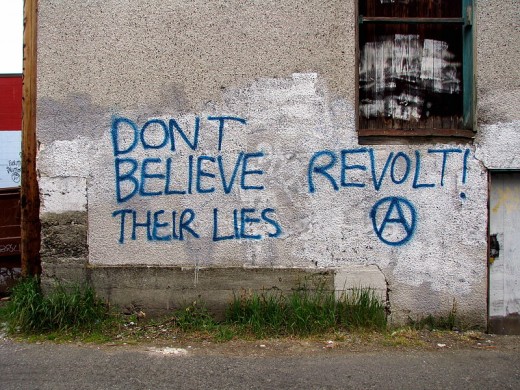Lies-Lies-Lies: The Bias of Modern Media Coverage

How is it that we are supposed to separate the truth from deception? Do the conspiracy theorists have a point? Are all politicians, media-moguls and bankers, bastards? – In this hub I shall start the process of answering some of these pertinent questions and more…
The Truth
For thousands of years philosophers have brayed on about the importance of understanding the nature of truth. “How can we claim to know what is true if we can’t say what truth is?” They whine piteously. Annoying aren’t they? In the end it boils down to something being true if it actually is the case, and this is verifiable. If you can’t verify it – you can only say that you believe it is true, and not that it is true. As I said… annoying.
What concerns me is that the media aren’t necessarily sticking to these rules. They often represent things as truth while actually playing clever little language games that are designed to influence the opinion of the reader to favour a particular world view. Add this to the general lack of scepticism that the average reader/viewer displays towards the information fed to them by the media, and we have a population of people whose opinions are in effect under the control of large media corporations and the political pressure groups they affiliate with (either openly or behind closed doors).
John Daly suggests that " ...the cable talkers’ MO (is that) they don’t accuse anyone. They only infer something about you that their audience takes as the truth.[1]
[1] http://informednotinflamed.com/define-media-bias/"
In other words, they decide upon the slander that they'd like to spread and then say it, but indirectly. Cheeky buggers. If you're looking for an example of bias in media coverage, then a comparison between coverage of Palin verses Biden probably fits the bill. Palin makes a good story because she’s gaffe prone and frankly her ignorance makes for hilarious T.V. – she was running against Biden who actually seemed to have a handle on the real world. 62000 stories concerning Palin were covered, Biden was covered in under 30000[1]. Think he was under represented? Looks like it to me.
The funny thing is, although this is represented by liberally biased news coverage as conservative media bias, it is actually more likely based on viewing figures. People on both side of the fence have stronger emotional reactions to Palin’s big mouth (I think I may be betraying my own bias here) and so turn on to watch in either adulation or to have their own dislike vindicated. Biden just didn’t command that much emotional response.
Unfortunately, and I hate to admit it, but as John Daly proposes in his article: Cable News Media Bias Examples: You’re The Cause and What You Must Do, that means it is our fault! We choose what to watch and the media choose what to show based on viewing figures for different types of program. Damn. I hate it when I’m responsible for stuff I don’t like – now I’ve got to do something about it!
There are however, real cases of media dumbing down and political bias. Here are some examples:
In this instance we have a definite case of dumbing down. It seems to have an underlying political agenda as well. The clip below has a blatant political agenda. It is horrifying to see how politicized the Fox network seems to get in its news shows.
In this next clip we see another example of a Fox network presenter being forced to confront his own dishonesty and yet completely refusing to admit his culpability or the responsibility of his network to report truthfully on such matters.
Impartiality poll
Should impartiality in media representation be made a legal requirement?
Need me to go on? I didn’t think so. I’ve covered examples from both CNN and the Fox news network here. There are examples of bias in my own country’s media as well, but this is more evident in the newspapers rather than the T.V. coverage. The BBC manages to be fairly neutral on the whole and I have a huge amount of respect for that organisation. The only newspaper that seems to have impartial reporting though in the majority of cases these days in Britain seems to be the Financial Times. Why is this?
In the end it comes down to the interests of the people who own the paper. What a shock. As if we ourselves were in control of the world media we wouldn't influence what was printed in order to spread our own world view; it is natural and we shouldn't get incensed about it. I do not think many people would behave much differently. If it was enshrined in law that media had to represent things impartially, that might change things. Why isn't it made a law? What do you think?
When we are discussing influences on the way things are presented, it also has to do was the type of language that is used when the media and the politicians decide to talk to us. It is almost as if a special language has been invented within the English language. It is a language of no comittment. A language which enables the profficient speaker of it to give the impression that they have said something of substance, when really they have said nothing at all. A language which implies support or opposition but allows space for u-turns and complete deniability. George Carlin demonstrates what he's noticed about the language of politics beautifully:
Now to touch on something less amusing (not that the lies and prevarications of the media are all that funny) – I have had conversations recently with conspiracy theorists that have left me thinking them utterly crazy. The scale of the deceptions that they suggest to be taking place, are gargantuan. So huge and far reaching that the idea of them having any truth to them seems ludicrous. That’s just extreme paranoia! I told myself. There would be more whistle-blowers if something this insidious and invasive was going on! There would be more evidence!
The thing is, that there have been plenty of whistle-blowers, and there is quite a lot of evidence too. However, any whistle-blowers who have had any real chance of influence have died in mysterious circumstances. Evidence has been summarily disavowed, discredited and smeared. So that I don’t have to type the individual examples again, I suggest you have a look through the info available on: http://www.thirdworldtraveler.com/. Give it a chance, it is less kooky and more cogent than you'd think.
I think perhaps the problems whistle-blowers of genuine big conspiracies have are A) The media represent them as crazy and so no-one listens and B) There are a lot of real nut-jobs and clear money-grabbers out there making the sane conspiracy theorists look bad.
How can a sane man go on T.V. and bare witness to unbelievably horrible things about the people in charge of the world and trust that he'll be believed when news anchors are likely to compare him with a man who claims that the Queen of England is a giant Lizard? No matter how good the man's arguments, or how relevant his evidence, the public who watch that broadcast still connect him with the nut-job.
To Conclude
I think the most important thing to do is in the first case when hearing an opinion... always remember first that that is what is is, an opinion. Don't buy into opinions just because they back up the world view that you prefer to identify with. Ask the appropriate questions first, and always, always check your sources.
If you hold any opinions that aren't held by the majority and often get ridiculed for them, just make sure you have solid evidence to hand to back yourself up. If you can't find solid evidence then you cannot and must not present your opinion as fact. Without evidence that proves your view to be the truth, then what you are representing is an opinion at best.
If you hold the popular view and find yourself being bombarded by the crazy views of anti-establishment rebellious types, the same applies. Make sure you have evidence to support your opinion - the fact that most people think something is the case does not necessarily mean that it is the case! If you can't back up your views with anything other than the numbers of other people who believe it to be the case, then it's time to go do some research.
Remember this: you are responsible for the opinions you express and the people you influence by that expression. Make sure you know what you're talking about before you start talking!
Links to other relevant hubbers
- Lies, Slander, and Politics: Why Politicians Should Be Prosecuted
Politicians seem to get away with saying whatever they want about their competition in elections without any repercussions, even if it is clearly false. Though this is both legal and socially unacceptable, it continues to be a constant problem for po - What Causes Media Bias?
Media bias is real - but it is not simply a matter of liberal media vs. conservative media. That division is a manufactured one, and it is a great example of the way media figures manipulate the facts to get ratings.
Links to other hubs by me
- How to get out of a rut: Improve the quality of your life through action
Have you found yourself in a rut? Have you ended up going in the wrong direction down a dead end path in life? Here are some steps you can take to turn your life around.



![George Carlin: Best Stuff [DVD]](https://m.media-amazon.com/images/I/51asWBseTtL._SL160_.jpg)
![George Carlin: The Very Best of- 1977-1984 [DVD]](https://m.media-amazon.com/images/I/51wSUx2-hOL._SL160_.jpg)







